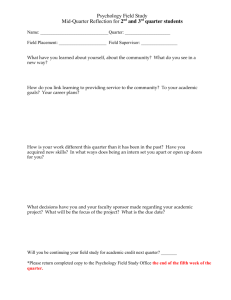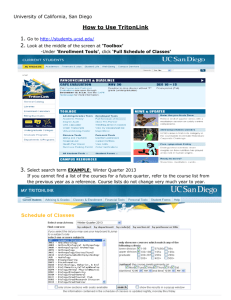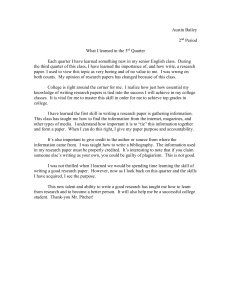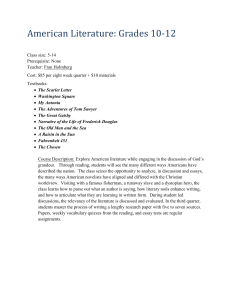The Practice of Reading Literature
advertisement
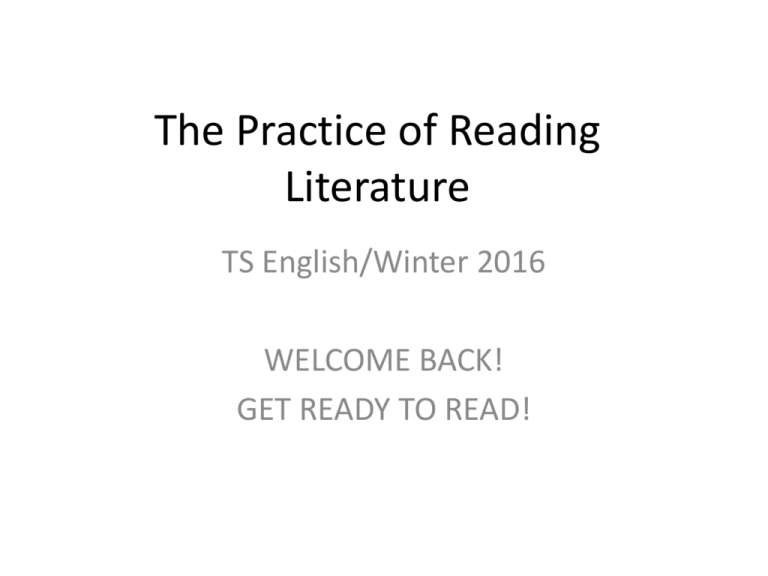
The Practice of Reading Literature TS English/Winter 2016 WELCOME BACK! GET READY TO READ! Last Episode… on TS English • Fall Quarter – Standards of Composition – The goals that you set for your writing last quarter are still the goals you should set for your writing this quarter. – Particularly: ANALYSIS and CLAIM – Use your progress reports to set goals for yourself this quarter – it will be up to your to pursue your own improvement in these areas. Last Episode… on TS English • Fall Quarter – Standards of Composition • Winter Quarter – METHODOLOGY! – Most of you have been trained to read in particular ways and for particular purposes: comprehension, interpretation. – At the University, in MANY disciplines (not just English), reading is a scholarly procedure, which generates academic arguments • Different types of reading for different types of questions/claims • Held to academic rigor What do you mean by “practice”? • If we are to truly examine how literary texts construct meaning, we must develop self-conscious, academically appropriate reading strategies – different “reading practices” if you will. • “Reading Practices” – techniques or methods for interpreting and understanding the sources of meaning. • My purpose in this class is to introduce you to these practices/strategies, so that you may take them into other classes and analytic contexts. • This goal has both practical and conceptual ends. Practical Course Goals 1. To teach you some concrete strategies for analyzing various types of literature. – Imagine this: you are enrolled in an English class and on the first day, your instructor hands out a poem and asks you to “analyze it.” What do you do? – What types of things should you start off looking for? – What are the importance of things like rhythm and rhyme? – What reading strategies can you employ to interpret the poem? • When you leave this class you should have at your disposal a whole collection of strategies for making meaning of literature in its standard forms. Practical Course Goals 2. To teach you modes of analysis that give you access to different types of claims! – Here is something that most people will never think about directly: Almost anyone can read a story and interpret some kind of meaning: Frankenstein = “man’s hubris” – Most of us can answer the question “What does it mean” but very few can intelligently say “why” and “how” it means that. • Our question in this class: Not “what does it mean?” but “HOW does it mean that?” – “How does meaning work?” Conceptual Goals 3. To introduce you to methodological debates in the Humanities. – Reading Practices emerge from different theoretical accounts of language and meaning. – Scholars continually debate these theories, and “How to read” is an academic conversation in and of itself. – How do scholars think critically about how reading and writing function? Conceptual Goals 3. To enable us to ask “big questions” about language and meaning. – “Literary” works make use of language to construct meaning in a startling variety of very different ways. – They are an occasion to ask ourselves if we really understand how language works and to construct a more complex picture of how writing and reading operate. – Words are not just labels for things, and “language” is not just words! Meeting These Goals • Paper prompts will ask you to perform particular methods of analysis (unlike last quarter, where they demanded you engage a topic) • We will engage a variety of genres (the novel, poetry) and ask how they work • We will read works that are, themselves, meditations on the act of writing, reading, storytelling – the power of the written word Hints for Performing Well in this Class! 1. Don’t allow yourself to fall behind! – – This class is going to move at a very rapid pace. If you don’t understand something, or are confused about a particular reading or lecture, DON’T WAIT TO SEEK OUT HELP! Make use of office hours (mine and Mara’s) over the course of the quarter. Don’t wait until the week before finals to take note of all of the things you might have missed. 2. Plan your reading ahead! – Because of the structure of the course, the reading schedule is highly uneven – some weeks we will only read a few short poems, other weeks you will be expected to consume 300 pages or more of narrative. Read the schedule and plan accordingly! Hints for Performing Well in this Class! 3. Begin the writing early! – – There is no portfolio “safety net” in this class – the draft you turn in will be the draft you are graded on. Plan for meetings and take note of Mara’s draft due date. 4. Take good notes! – – – The final in this class is cumulative - it will cover material from the first day to the last day. Exam material will not come exclusively from instructor lecture, but from class discussion as well. Being prepared for this exam will entail having wellorganized and legible notes to review. Opening Questions • If we are going to formulate self-conscious methods for understanding literary meaning, we need to ask ourselves “what are we actually doing when we read something?” • This question begs two different and very complex academic questions: 1. What is language and how does it work? 2. What is meaning and where does it come from? 3. What is a text and under what terms do we interact with it? • • While we are learning how to read poems, plays, and prose fiction works critically, we will also be learning how language works and how it constructs “meaning” Have we already encountered a perspective on these questions? Conceptual Course Questions • Consider the following two quotes (also featured on the course website) “Poetry is the spontaneous overflow of passionate feelings…” - William Wordsworth “Language is legislation, speech is its code. We do not see the power which is in speech because we forget that all speech is a classification, and that all classifications are oppressive” - Roland Barthes Conceptual Course Questions Hemingway’s (?) shortest short-story: “For sale: baby shoes, never worn.” What is the “meaning of this story” Where does this meaning “come from”? Shakespeare! • For Wednesday, read McDonald’s “To What End Are All These Words” – Reading question: What are all of the different angles on interpreting Shakespeare’s language that McDonald offers? • Tips for reading The Tempest – Remember that it is a play, meant to be performed – Don’t get bogged down in footnotes – Read aloud!

